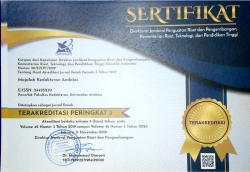The Relationship Of Therapy Frequency, Food Intake, And Nutritional Status With Quality Of Life In Breast Cancer Patients At The Andalas University Educational Hospital
Abstract
Breast cancer is a non-communicable disease, the development of cancer cells affects a series of organ functions. Treatment for breast cancer is generally divided into three, namely mastectomy, chemotherapy and radiotherapy. Objective: To determine the relationship between frequency of therapy, food intake and nutritional status with the quality of life of cancer patients. Results: Cancer cell activity in the body is characterized by pain, especially in the cancer area. The frequency of therapy >3 months has an effect on decreasing nutritional status, the therapy undertaken has side effects, both chemotherapy and radiotherapy, resulting in side effects such as nausea and loss of appetite. Conclusion: Patients who undergo therapy for 3 months tend to be underweight, if the food intake they receive according to their needs will reduce the risk and disruption of a series of body system functions. Regulating the types of food with a regular eating pattern increases the body's physical defenses. Maintaining normal nutritional status while undergoing therapy can maintain physical quality that is related to quality of life.The Relationship Of Therapy Frequency, Food Intake, And Nutritional Status With Quality Of Life In Breast Cancer Patients At The Andalas University Educational Hospital





















